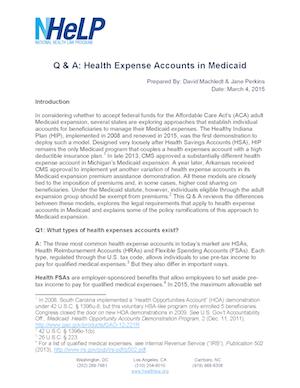By: David Machledt and Jane Perkins


Executive Summary
In considering whether to accept federal funds for the Affordable Care Act’s (ACA) adult Medicaid expansion, several states have turned to approaches that establish individual accounts for beneficiaries to manage their Medicaid expenses. The Healthy Indiana Plan (HIP), implemented in 2008 and renewed with changes in 2015, was the first demonstration to deploy such a model. Designed very loosely after Health Savings Accounts, HIP remains the only Medicaid program that couples a health expenses account with a high deductible insurance plan. CMS has approved two substantially different health expense account demonstrations in Michigan and Arkansas. All these models are closely tied to the imposition of premiums and, in some cases, higher cost sharing on beneficiaries. This Q & A reviews the differences between these models, explores the legal requirements that apply to Medicaid health expense accounts and explains some of the policy ramifications of this approach to Medicaid expansion. A summary of key takeaways from this report is also available.